A whopping 63% of American adults drink coffee daily, according to the National Coffee Association USA (NCA). There’s no doubt that coffee is big business, involving growers, roasters, importers, packagers, retailers, baristas and a whole host of other folks.
Table of Contents
This makes coffee a perfect example of how changing a simple daily habit, in this case choosing sustainable coffee, can have profound global effects. So, which are the best sustainable coffee brands? I offer my top picks for the best sustainable coffee brands below.
Need a more sustainable, eco-friendly coffee maker? Check out our top choices for French presses and coffee makers.
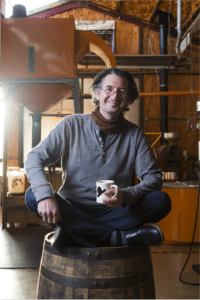
Our top pick for ethical coffee
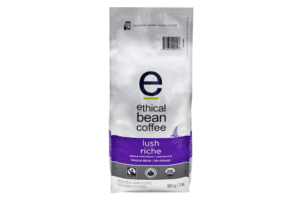
LEED certified coffee roasting facility
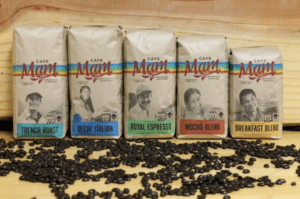
Third pick
Once you’ve picked out your coffee of choice, make sure to also take a look at the best French press coffee makers we could find, and the best energy-efficient coffee makers too!
Curious about how we rate products? Click here to view our methodology, which at its core, is about voting with our dollars to fight climate change.

Larry’s Coffee
Highlights: Absolutely delicious, unique, small-batch Fair Trade, Organic, Shade-Grown coffee from a longstanding eco-friendly and sustainability-minded company – now with recyclable, BPA-free k-cups!
Larry’s Coffee is possibly the most sustainable, eco-friendly, and downright delightful coffee company around. They’ve been in the business since 1993, under the name Larry’s Beans, and have been a force for fair trade, sustainable coffee for nearly three decades. They know their coffee and are clearly committed to sourcing the best beans and using their roasting expertise to create the freshest, highest-quality, great-tasting coffee. All of their coffee is Organic, Fair Trade, Kosher, and Shade-Grown (i.e. bird-friendly), and they recently launched a line of fully recyclable k-cups that are BPA-free (View Price on Amazon), though it’s still best to avoid pods where possible.
Larry’s Coffee is based in North Carolina, and even their roastery and offices are eco-friendly. They collect and use rainwater for the washrooms, have solar water-heated flooring, company-wide composting, delivery locally using a veggie-oil-fueled school bus, and host Raleigh’s only biodiesel pump.
The company is a certified B Corporation and a founding member of Cooperative Coffees, an organization of independent coffee roasters who import coffee directly from farmers, so as to establish a genuine and fair partnership.
Larry Larson, the company’s founder and CEO, is a quirky kind of fellow with a fondness for blueberries (hence the company’s edible landscaping) and a clear commitment to Fair Trade and sustainable agriculture. He also fosters a culture of creativity, roasting beans in small batches to find the perfect time (somewhere between 12 and 20 minutes, apparently) for each harvest, so as to highlight the flavors unique to every seasonal bean crop.
Larry’s Coffee takes the approach of working with very carefully selected small farms, currently sourcing from 16 or so countries worldwide. These farms are typically around 2 to 5 acres, making the coffee beans used by Larry’s pretty darned special. The small scale of these farms usually means coffee importers can and do take advantage of their lack of bargaining power and access to international markets, with serious price gouging rife in the industry. Not so at Larry’s Coffee. They look to create long-term partnerships that pay well so as to sustain small-scale growers to produce the best coffee year after year. Indeed, Larry’s offers farmers pre-financing and treats farmers as partners, not just as suppliers.
Oh, and they love to use puns when naming their coffees, which earns them extra points from me. Check out their 5 lb bag of Bean Martin, described as follows: “The rich earthiness of Sumatra melds with the sweet bright berry notes of unwashed Ethiopia, that’s dark without being burnt; A dark roasted Bolivia is blended to unite it all with a rich, creamy body and a hint of chocolate that weaves throughout.” Delicious!

Ethical Bean
Highlights: Great-tasting, Fairtrade and organic certified coffee roasted in a LEED standard energy-efficient factory.
Fairtrade Certified, organic, and roasted in a LEED standard facility using an energy-efficient Smart Roaster, Ethical Bean coffee is a great way to start your day. I’m a big fan of the Lush coffee from Ethical Bean and of the company’s transparency; conveniently, they list their certification IDs on their website for easy verification, and every bag of Ethical Bean coffee comes with a unique QR code that tells you exactly where your coffee was grown, when it was roasted, and how the company’s Director of Coffee scores it.
Speaking of the Director of Coffee, Aaron De Lazzer became Canada’s first Certified Q Grader in 2008. Never heard of a Q Grader? Neither had I until researching this article! It turns out that Certified Q Graders are professional coffee graders and cuppers whose skills and senses of smell, taste, and probably general good sense have undergone rigorous testing. These folks are the coffee industry’s eminent experts, so it’s a real boon for Ethical Bean to have De Lazzer on the team.
Ethical Bean buy exclusively ‘washed’ or ‘wet processed’ coffees from fair trade farmers who grow the beans under natural, shaded canopies, using farming methods free from harmful chemicals and synthetic fertilizers. The coffee isn’t certified Shade-Grown, and Ethical Bean dodge the question a little bit in their FAQs, noting that the standards for Shade-Grown vary for different sources, so they don’t market their coffee as shade-grown. Given their other efforts, I’m willing to give them the benefit of the doubt on this one, but it would sure be nice for them to round out that response.
The company has partnered with Bullfrog Power to purchase renewable energy for their roastery and vehicle fleet and claim to have displaced 938 tons of carbon by doing so. They also work with Climate Smart to offset remaining emissions, using Gold Standard offsets. Ethical Bean were also one of the early companies adopting the use of 100% certified compostable single-serve coffee pods (View Prices on Amazon).
Ethical Bean also donates a portion of profits to Child Aid’s FUNDIT program to support school children in Guatemala. The Ethical Bean Coffee Scholarship Fund turns ten years old in 2020, and the company has been involved with FUNDIT since 2003. They also donate to Project Somos, an eco-sustainable village and community for at-risk mothers and children in Guatemala.
For customers living in Canada, Ethical Bean Coffee can be purchased from their online store here at this link, but they recommend shopping through their Amazon store for anyone outside of Canada.

Café Mam
Highlights: Certified organic, Fair Trade, Shade-Grown, and as sustainable as coffee can be, with a new line of shelf-stable fully biodegradable coffee packaging (even with a biodegradable degassing valve!).
The 1990s were a boon time for coffee start-ups, with Café Mam joining the likes of Larry’s Coffee and Conscious Coffees in establishing a more sustainable coffee business model. All of their coffee is fair trade, certified organic (by Oregon Tilth), and shade-grown, and is sourced from indigenous coffee cooperatives, including native Mayan coffee growers in the highlands of Chiapas, Mexico.
Café Mam offer 12 coffees currently, and all packaging is recyclable or compostable. They use the Swiss Water process for decaffeination, which is an organic certified process, and they offer decaf versions of all of their coffee, rather than just one begrudging option. This innovative company just released a line of newly packaged coffee that has a biodegradable degassing valve (kind of the holy grail of sustainable coffee packaging). That makes their bags completely shelf-stable and biodegradable, and the first such bags to hit the shelves in the US.
Café Mam beans are Fair Trade Certified™ by Fair Trade USA and certified by the Small Producers’ Symbol (SPP), an intercontinental network of ecological small-producer organizations. They donate 2% of sales ($900,000 so far!) to non-profits dedicated to social justice and environmental causes, and each sack of coffee has a robust audit trail, so you can be certain there are no nasty chemical involved in the growing, cleaning, drying, milling, bagging, transport, shipping, import, inspection, warehousing, roasting, or packaging process.
Café Mam are committed to supporting sustainable coffee and work with farmers who practice “terracing, composting, and regenerative pruning.” Terracing helps to conserve rainwater and reduce run-off, which helps prevent soil erosion and protects plants and waterways. To maintain organic certification, the farmers plant leguminous shade tress and establish a seedling nursery, and they encourage biodiversity to help control pests that can damage coffee crops.
Their packaging is 100% recyclable or compostable, with natural Kraft paper and a compostable liner for all their bag sizes. To compost, remove the tin tie (which should be recyclable in most municipalities), and put the liner in your compost or send to your municipal composting facility.
The cardboard shipping boxes are recycled, unbleached boxes that can be recycled again, and all of their printing paper is made from 100% post-consumer, recycled office waste. This conscious company also uses delivery vehicles that run on biodiesel, and that biodiesel is locally sourced (SeQuential BioFuels).
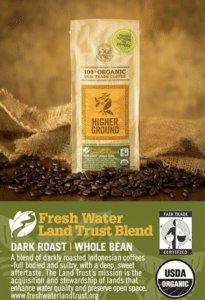
Higher Ground Roasters
Highlights: Shade-Grown, Fair Trade and Organic Certified sustainable coffee from a company that cares.
All Higher Ground coffee is 100% Certified Organic, Fair Trade, and Shade Grown and the company strives to develop and maintain a completely sustainable business model. They offset their daily energy usage with wind power credits through Renewable Choice Energy, which helps subsidize wind farms., and have established partnerships with non-profits such as The Black Warrior Riverkeeper and The Cahaba River Society working to promote sustainability and environmental conservation efforts.
Higher Ground coffee is roasted and shipped to order, so everything is fresh and delicious. They also currently offer four coffees where all proceeds go to a specific non-profit: Alabama Rivers Alliance River Roast; Black Warrior Riverkeeper Blend; Cahaba River Society Blend; and the Freshwater Land Trust Blend.
With around 20 additional coffee offerings, and subscription packages too, Higher Ground has you covered. Their Decaf roasts and blends are all certified organic and created using the Swiss Water process. My top tip for those of you who like a sweeter coffee with hints of milk chocolate is to check out the Higher Grounds Magic City Blend. This medium roasted and bodied coffee is one of their most popular blends, and for good reason. It is “uncommonly sweet, characterized by the taste of wild berries that lingers on the palate until joined by a smooth milk chocolate aftertaste and a clean finish. Rich and flavorful, it’s perfect for your morning cup.”
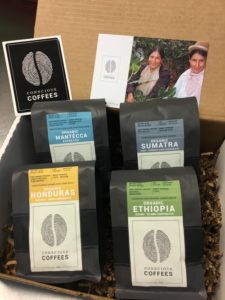
Conscious Coffees
Highlights: One of the world’s best B Corps and makers of fresh organic, sustainable coffee.
Conscious Coffees has been in business since the early 1990’s and was bought in 2017 by Craig Lamberty, a businessman and coffee connoisseur determined to continue and broaden the ethical approach of the founders Mel and Mark (two enterprising baristas!).
Conscious Coffees have been recognized by B Corp as Best for the World every year since 2015 and were 2018 Best for the World honoree, earning a community impact score in the top 10% of all Certified B Corporations internationally. This means they’re doing great things for workers, the community, and the environment, showing other coffee companies the path to sustainability.
Like Larry’s Coffee, Conscious Coffees is a founding member of Cooperative Coffees, and have imported coffee beans direct from farmers since 2003. They source beans from the same producer partners year after year, crop cycle to crop cycle. This means they can better maintain quality and guarantee farmers a reliable source of income. The coffee is all certified organic and there are currently 11 global coffee selections to choose from, plus a decaffeinated option and some sampler packs.
Conscious Coffees remains a small family-owned business and they roast the coffee fresh to order. You can buy individual bags or sign up for a subscription, so you’ll never run out!
As it’s not mentioned explicitly on their website, I reached out to ask about Fair Trade certification and whether their coffee beans are shade-grown. Happily, I got a super-fast (caffeinated?!) response from Craig, who let me know that almost all their coffees are shade-grown, with most of the farmers using cash crops (such as citrus and avocado) to shade their beans. Craig said, “We can’t guarantee that every bean we buy is shade grown but certainly the vast majority are. All of our beans are also fair trade.” Cooperative Coffees who we are a member of is Fair Trade certified as are all of our farmers.
I also asked about their decaffeination processes, and Craig let me know that they do use the water process for decaffeination but “It is not technically the Swiss water process because that must be done in Switzerland. Ours is done in Mexico.” Craig, I appreciate the attention to detail!
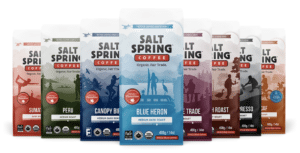
Salt Spring Coffee
Highlights: One of the best B Corps around, making 100% organic and sustainable coffee with Fair for Life certification and a strong reputation for deliciousness and solid ethics.
I’ve a soft spot for Salt Spring Coffee as I can almost see Salt Spring Island from where I live (on the west coast of Canada). Oh, and they have B Corp status, are members of 1% for the Plant and Fair for Life (fair trade), and make 100% certified organic, and 100% delicious coffee at a great price.
This family-owned business began in the 1990’s with a couple of coffee lovers who roasted up some beans using a converted popcorn maker and a wood stove. They loved the results and the process and opened up a café near their home on the island. Their incredible success means they now operate a roasting and packaging facility in Richmond, BC, Canada.
Not content with a triple bottom line approach, Salt Spring Coffee have their eye on the quadruple bottom line: people, planet, profit, and purpose. They’ve been a Certified B Corp since 2010 and named Best for the World in 2012, 2016, and 2017. They aim to “support the people and natural systems that sustain us to thrive along our entire supply chain.”
While you won’t see the standard Fair Trade logo on Salt Spring Coffee packaging, you will see Fair for Life, which goes beyond traditional fair trade by applying fair trade principles also to relevant domestic or regional trade and by requiring ethical working conditions along the entire trade chain. The company currently has just one coffee supplier who is not fair trade certified – Byron Corrales – who they still pay a fair trade premium and with whom they have a direct relationship. I wish all companies were this transparent!
Speaking of transparency, Salt Spring Coffee note that while they don’t require their suppliers to be certified Shade-Grown, the farmers they work with do use shade as part of their organic growing process. They’re clear that the reason they don’t require such certification of their farmers is because the certification process can be especially onerous, bureaucratically and financially, for small-scale suppliers.
This fantastic little coffee company also takes steps to reduce their overall energy consumption and details their progress on their website. They are close to being a zero-waste company, having increased their diversion of waste to landfill from 89% in 2012 to a whopping 96.4% in 2018, thanks to commitments to recycling, composting, and donations.
Their coffee bags are currently recyclable wherever food packaging plastics can be recycled, and they are actively researching biodegradable packaging that can keep coffee fresh but is able to be composted at home or in municipal facilities.
Salt Spring Coffee offer around 8 roasts or blends, including a decaf and espresso decaf, and a great-value sample pack of 8 coffees to try! They use the Swiss Water process for their decaf offerings.
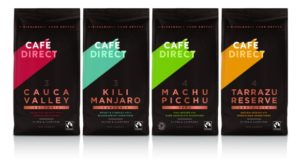
Cafédirect
Highlights: One of the original Fairtrade coffee companies and still doing great work in terms of sustainability, but seemingly not Shade-Grown and some coffees aren’t fully certified organic.
Cafédirect has long been one of the best sustainable coffee brands around, thanks to their commitment to quality, fair trade, and the environment. The company purchases 100% Fairtrade Tea, Coffee and cocoa and Cafédirect was the first coffee company to become Fairtrade certified in 1994.
To date, Cafédirect has contributed over £14.5 million in Fairtrade Premiums, and they have a long history of reinvesting profits back into the communities where the coffee is produced. Indeed, their partnership with Producers Direct, an award-winning charity owned and led by smallholder farmers, sees Cafédirect reinvesting up to 50% of their profits to support growers to improve the quality of their crops and the quality of their livelihoods.
Cafédirect don’t just offer coffee that makes you feel good about your purchase, they also make particularly delicious coffee! To prove it, they have won more than 30 Great Taste Awards in the last 8 years.
Only about 40% of Cafédirect’s coffee purchases are certified organic, with just four of their coffees listed under the Organic banner on their website. Confusingly, some of the other coffees still bear the organic Soil Association logo, however. I’ve reached out to ask why this is. My best guess is that while most of the coffee beans themselves are organic, the ones not listed as organic on the company’s website undergo some process after harvest that means the final bagged product doesn’t qualify for organic status. I’ve also asked about their stance on Shade-Grown coffee as Cafédirect makes no mention of this in their marketing.
Based in the UK, Cafédirect was probably my first exposure to sustainable Fairtrade coffee. I even used to sell it way back when I volunteered for Oxfam! Which also meant I drank it pretty exclusively for a good few years, both in the store and at home. I can vouch for the great taste of Cafédirect coffee, but would like to see them go fully organic and shade-grown, and to extend their home compostable packaging beyond just their new London Fields Range.
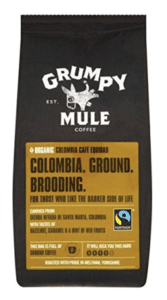
Grumpy Mule
Highlights: Mostly organic and fair trade coffee from a well-loved UK company.
Grumpy Mule are another UK-based brand and boast Fairtrade, Rainforest Alliance, and Organic certification for some, but seemingly not all, of their coffees. They clearly love their coffee, with a range of guides to brewing the perfect coffee, and some strong opinions on roasting methods.
Grumpy Mule currently offer 6 certified organic coffees, including one decaf created using the Swiss Water process. Several other coffees use the word organic in their names but aren’t listed as organic on their website. So, as with Cafédirect, I’ve reached out to Grumpy Mule to see what’s what. I’ve also asked about their shade-grown status as there’s no mention of this in the marketing. They do, however, note that their decaf coffees are created using the Swiss Water process.
Of note, Grumpy Mule is no longer a small independent coffee company. They were acquired in 2013 by Bewley’s, a massive tea and coffee company. While this might put off some readers, I checked out Bewley’s own record on ethics and they’re one of the better bigger companies, with almost all of their coffee certified to one degree or another. As of 2019, more than three-quarters of the coffee sold by Bewley’s companies was certified Fairtrade, and more than two-thirds was Rainforest Alliance and/or Organic certified, according to Ethical Consumer Magazine.
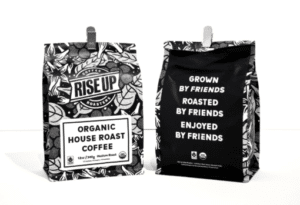
Rise Up Coffee Roasters
Highlights: An independent, small-batch coffee roaster and retailer in Maryland offering Certified Organic and Fair Trade coffee.
Rise Up Coffee has been in business since 2005 and is an independent small-batch coffee roaster and retailer that went from a coffee trailer in a small Maryland town to nine cafés and an active online store and wholesaler. The company now employs more than 100 people, helping to source, roast, and serve 100% Certified Organic and Certified Fair Trade coffee.
There’s no word on whether the coffee beans are shade-grown, nor any details of zero-waste or energy efficiency efforts. I’ve reached out to Rise Up Coffee for comment and will update accordingly.
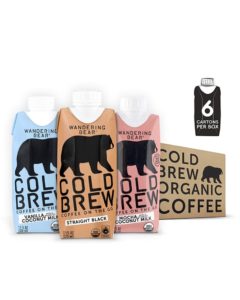
Wandering Bear Coffee Company
Highlights: Organic, Fair Trade, doubly strong cold brew coffee on tap and on the go from a fun little start-up with a serious coffee habit.
If cold brew is your jam, you’ll want to know about Wandering Bear Coffee Company. These guys make cold brew on tap in fully recyclable boxes and now in single serve fully recyclable cartons too. The coffee is (beware!) twice as strong as a regular cup but remains smooth and delicious.
The boxes of coffee on tap are USDA Organic, Fair Trade certified by Fair Trade USA and kosher (Star-K Dairy). The Straight Black coffee on-the-go is USDA organic and Fair Trade certified. The Mocha Coconut and Vanilla Coconut flavors are USDA organic certified and use the same Fair Trade certified coffee as the Straight Black but don’t carry the seal, and while they use kosher-certified coffee in all their products, the on the go boxes are not certified kosher (yet!).
There’s no indication that Wandering Bear source Shade-Grown coffee exclusively, or that they’ve taken any steps towards being zero-waste or more energy-efficient at their production facilities, but they’re a pretty new company so here’s hoping they step up!
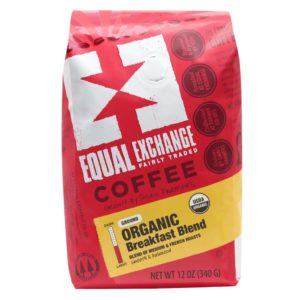
Equal Exchange
Highlights: Worker-owned Fair Trade and mostly organic coffee company with a long history championing coffee sustainability and workers’ rights.
Equal Exchange are a worker-owned coffee company with 120 worker-owners. That means the company isn’t beholden to outside shareholders or founders or partners but are instead responsible to each other, which helps them maintain their ideals and receive an equal share of any profits or losses from their work. The company was founded more than 25 years ago with fairly traded coffee from Nicaragua.
Most, but not all, Equal Exchange coffee is certified organic by Oregon Tilth (they cite around 98% as certified organic, by volume). The company says that a large proportion of those not certified organic come from farmers currently working towards certification.
Although they don’t have Shade-Grown certification, Equal Exchange note that most of their coffee is shade-grown, while others are grown in areas where deforestation has occurred and coffee is the principal crop being used in the restoration process. Given that organic and Fair Trade certifications already cover much of the requirements for Shade-Grown certification, the company has decided, like Salt Spring Coffee, not to require their partners to go through the process of certification.
Equal Exchange decaf coffee is primarily decaffeinated using CR3 Natural Liquid Carbon Dioxide Decaffeination, a natural form of decaffeination. Their packaging is mostly recyclable and BPA-free.
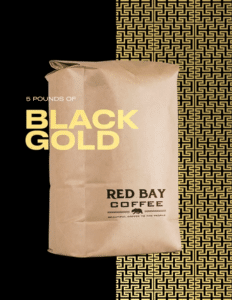
Red Bay Coffee
Highlights: Coffee company that is focused on ethical sourcing, socially responsible hiring and management practices, and community-building.
Red Bay Coffee is a B Corp founded in 2014 by Keba Konte, an artist and food entrepreneur. The San Francisco Bay Area company is focused on ethical sourcing, socially responsible hiring and management practices, and community-building. Indeed, the company proclaims a “firm commitment to ensure coffee production is not only high quality and sustainable, but a vehicle for diversity, inclusion, social and economic restoration, entrepreneurship, and environmental sustainability.”
What about that coffee, though? Well, all the beans are roasted at the B Corp certified Public Roastery on East 10th St. in Oakland, California. Red Bay Coffee have 8 signature coffees, including 3 espresso, 1 decaffeinated, 2 blends, and 6 single origins. They source coffee ethically from Brazil, Guatemala, Tanzania, Sumatra, Ethiopia, Colombia, Burundi, and Chiapas Mexico. They also offer 1 to 2 limited release single origin coffees and a cold brew and nitro cold brew. Most roasts range from medium to dark, and they decaffeinate their coffee using a compound found in ripe apples and wine.
While the coffee suppliers providing beans to Red Bay Coffee aren’t certified organic due to the expense of certification, they do tend to use organic and ecologically sound farming practices. There’s no mention of whether the beans are shade-grown, however, so I’ve reached out to the company to ask for more information and might add a leaf to their rating if the coffee is bird-safe.
Red Bay Coffee maintains direct relationships with these farmers and co-ops, including Burundi Kamikazi, members of the International Women’s Coffee Alliance Burundi chapter. This direct relationship means the farmers get a higher price for their coffee.
The Red Bay Coffee Pubic Roastery also serves as a community hub, hosting all manner of community-minded events.
Hi Good info for the kindred eco-minded.
We get our coffee from Higher Grounds Trading Co. located in Traverse City Michigan. Maybe they’re too small to make your list? We receive by mail but they are sustainably supporters with loval cooperatives in several countries they & they do commercial & all local delivery by bicycle trailera ; ).
Please give them a look & a taste. I’ve tried most sustainable brands they are the best.
Brew conciously
Bruce
I LOVE your point about delivery by bicycle! I wish that companies, including the shipper like Amazon, also thought about their packaging. I understand people are used to smaller throw away options, but bulk in reusable containers is also a way to be eco-friendly. I love all the other initiatives they are doing though! Change is all these steps. Thank you for pointing out smaller local cooperatives & the methods they creatively employ to be a truly eco-conscious business.
Hi there, how about Kafetero.com, they have omnidegradable packaging which means it is biodegradable, and recyclable at the same time. 100% organic, 100% rainforest alliance, and 100% fairt-rade, single sourced from Colombia and the quality grade of the beans is in 82, that would be better than 90% of the coffees that are available in North America. Also they ship by sea to save on the footprint of shipping. Let me know if they would be able to make the list.
Hi Karol,
Thanks for introducing Kafetero. The packaging sounds great, as do the other credentials. I’m curious though if the coffee is independently tested at all, for contaminants and such, and if it is shade-grown? If you’re a company representative, please send me an email with more info and we can consider the brand for our next update!
All the best,
Leigh
Do any of these companies use plastic free / home compostable bags and packaging? Thank you!
Hi John,
Great question! And something we try to include when figuring out the leaf score.
All of Café Mam’s packaging is recyclable or compostable, with the liner (with tag removed) able to be composted at home or in municipal facilities. Ethical Bean’s coffee pods are compostable at home, but come in (recyclable) plastic packaging, sadly. Cafédirect has a London Fields range that has home compostable packaging.
I’d keep an eye on Salt Spring Coffee too as they’re actively researching home compostable packaging.
If you know of any others, I’d love to hear about them!
Thanks!
Leigh
Have you heard of Pachamama Coffee Cooperative? They just won the 2021 Sustainability Award from SCA!!
It’d be great to have the locations of each of the growers/roasters available on this list as the more local the coffee, the less shipping energy is required.
I disagree with Larry’s being first simply for the fact that their pods are recyclable as opposed to compostable. Everyone knows that it is best not to create or use plastic. We need to scale down/stop the use not continue it. Compostable should be the only option for a true eco-friendly company.
I love Level Ground Trading coffee (and Earl Grey loose tea). My favourite of the honorable, humble, long-standing little company’s coffees is its light roast. It’s so great to find a small business that’s so worthy of patronizing. Would be nice to see Leafscore review it! I have no vested interest.
Thank you for this article!! I just ordered Larry’s Mocha Java, and thought Jim’s double chocolate was the only organic chocolate coffee out there! His is great too though, shade grown and sustainable…I’d love a leaf review on his btw. But thanks again, now I have options! <3 <3
Shannon